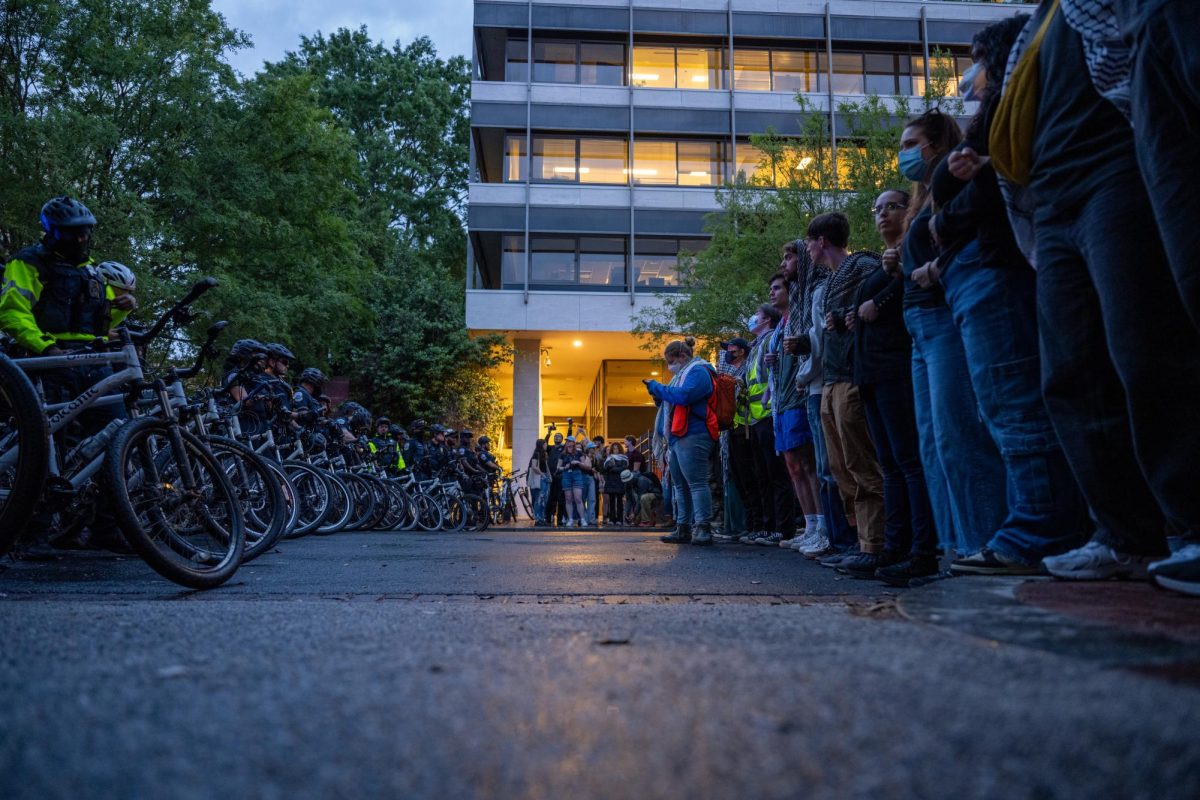Don’t bag MPD
In reading Monday’s Letters to the Editor (Oct. 29, A4), I laughed at the two letters from students complaining that students were going to start getting ticketed for jaywalking. As a police officer, my job includes enforcing traffic law as much as any other law. I love the argument that police should be out focusing on “real crimes” and leave the poor jaywalkers alone.
No, you don’t need mommy to hold your hand and yes, you should have learned how to cross the street in kindergarten. The only difference between now and when you were a kid is that you are now old enough to be held accountable for your actions. You don’t want to receive a ticket, then don’t jaywalk,.It’s as easy as that. Further, don’t try to pass the blame of vehicle versus pedestrian collisions solely on the driver. Yes, 14 percent of fatalities occur because of unsafe speed and failing to yield the right of way, but pedestrians also have a responsibility to yield the right of way, hence we have electronic signals with hands telling us when we can walk and when we can’t.
And just because you haven’t seen the Metropolitan Police Department pulling over motorists and citing them doesn’t mean it’s not happening because a majority of police enforcement happens outside the public view. Worry about what you are doing and don’t complain when the police do their job. If you get caught then it’s your bad, not theirs.
Investigator Rick Gendreau, Alumnus
Reason Against Racism
As shown by The Hatchet’s numerous articles regarding “racially insensitive” behavior, I’m afraid that some of us are overreacting, blowing these occurrences out of proportion and drawing conflict from where it scarcely exists. For example, not a week goes by where I don’t see something obscene written on someone’s door-mounted whiteboard. I offer my most sincere condolences to the student victimized by the senseless swastika drawing and to my friends in the greater Jewish community for any offense they have felt from it.
At the same time, I’ve walked past more than one whiteboardswastika in my day, but even more phallic symbols. Yet, there has been no outcry at the number of these drawn on whiteboards across campus nor breasts, nor the ever popular “poop.” Arguably, the symbol of a sadistic regime is more offensive than a wiener, especially to our Jewish students who fully recognize the pure evil that the Nazi symbol represents. Still, many Jews and non-Jews alike simply clean off their whiteboards and dismiss whatever nonsense written on them as trivial and move on.
As for the case of the Hitler photo used in a residence hall campaign, I was amazed at the tenacity with which Micah Lubens was attacked by those in his own Jewish community. As students like Lubens blatantly ridicule people like Hitler, I think we should put these “racial controversies” into perspective rather than jump at the mention of a swastika or Hitler’s picture. Two years ago I left an employer because my boss repeatedly called me a wetback, spick and beaner. I didn’t publish my account in the local paper. I cleaned off my whiteboard and moved on as a more mature and dignified person, leaving the racists to themselves. Amid swastikas, Hitler pictures and a week-long attack on Islamic world powers, I can only advise that the GW community do the same. I hope that we can ignore callings like one published in a letter to the Hatchet on Oct. 29 to “Get mad. Get angry.” It is from such madness and anger that true racism is espoused.
Sammy Lopez, Junior
Just the Facts
Two recent articles published in The Hatchet, “Protest disrupts District” (Oct. 22, A1) and “Bar Belle: M St. Anarchy” (Oct. 25, 7) documented the October Rebellion which marched through the streets of Georgetown on the night of Oct. 19. Both authors were mistaken about the purpose and message of the protest, as both said that the protesters themselves were neoliberalists.
The Hatchet has its facts wrong. Neoliberalists are generally supportive of economically liberal policies including free trade, privatization and less regulation of and restrictions on businesses. The protesters were anti-neoliberalists. More specifically, they were against the neoliberalists who run the International Monetary Fund and the World Bank. One major purpose of the Rebellion’s many activities that weekend was to, in their own words, “confront neoliberalism.” If the authors had done any bit of research at all on the group, they would never have missed this vital fact.
I am disappointed that GW students and Hatchet staff cannot identify neoliberalism and neglected their research. This appears to show a one-sided viewpoint on this issue, so ignorant of the other side that they cannot accurately report on why the October Rebellion was protesting. But perhaps it also reflects poorly on the University itself. The political ignorance that causes someone to call the same group of people anarchists and neoliberalists is troubling, especially when so many GW students are interested in future careers in politics.
The protest didn’t fail because of violence, it failed because observers were not able nor willing to understand key arguments of the protesters, and this is a very upsetting thing. The anti-neoliberalism and anti-globalization movements are growing voices, and our generation should have just as strong an exposure to and understanding of these movements as they do of their opposition.
Anna Woodbury, Sophomore





